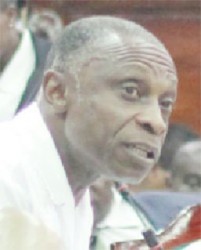With a looming November deadline for the Commonwealth to choose its new Secretary General, Guyana is of the view that should regional consensus not be found, the Caribbean could lose its chances of snagging the post.
Foreign Affairs Minister Carl Greenidge told Stabroek News that Guyana is still holding out hope that a consensus will be had in Caricom, while noting that up to now challenges persist. “You will appreciate that Caricom itself is challenged to settle for a single candidate and we ourselves were hoping that would be best route,” he said.
According to Greenidge, a Caribbean consensus was relevant and necessary “because if that were to happen, the chances of the Caribbean candidate retaining or getting the positon would be a lot stronger.”

Asked if Guyana was prepared to name its own candidate, Greenidge said that for now that remains “a last resort,” but admitted that “at some point we may have to do that.”
He said that the issue was ongoing and although it was slated to be discussed it was not during the Caricom Heads of Government conference, held in Barbados earlier this month.
The post of Secretary General is rotated between Commonwealth regions and the Caribbean is due for the next term.
So far, Antigua & Barbuda has nominated Sir Ron Sanders, while Trinidad & Tobago has nominated Dr Bhoe Tewarie and Dominica has nominated Baroness Patricia Scotland. Sanders has since withdrawn himself for consideration.
Grenadian Prime Minister Keith Mitchell has expressed the same sentiments as Greenidge and he did so in Barbados, where he made it known that while nominations were made internally, members of Caricom did not discuss the issue privately. He said that the approach to the nominations were not beneficial to the region’s overall goal.
In November of last year, Director of the Caribbean Council David Jessop said that through a united leadership from the Caribbean, the Common-wealth is poised to “change direction” as “it seems, too, that the organisation has lost its moral compass, and as a consequence its importance, and with it, its relevance to many Heads of Government, as evidenced by their declining attendance at biennial Commonwealth Heads of Government Meetings (CHOGM).” He said of Scotland that “she is widely regarded as Britain’s candidate for the role,” while Tewarie, an “internationally respected politician… in comparison is little known in the Commonwealth and appears to have little relevant experience.”





